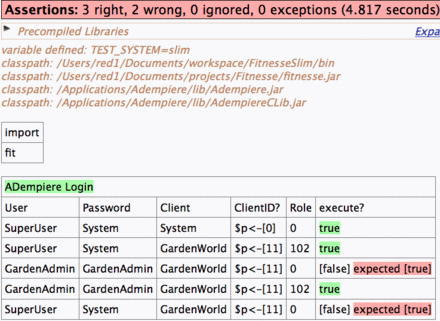Cost Engine/Testing
From ADempiere
This Wiki is read-only for reference purposes to avoid broken links.
Introduction
- Testing is vital and crucial as software death can happen.
- We need to examine the overall compliance to our best practice besides going through the features, requirements and test plan.
- Then we examine the best tools for a test suite.
- Fitnesse is one such tool already explored by Carlos Ruiz and Ivan Calderon's team at Interopen.
- Fitnesse expands the concept of testing to be more bazaar like and allow anyone out there to test easily, diversely and constantly.
- It is easily upgraded to SLIM, a more powerful version of Fitnesse. (See right)
- Fitnesse can be run as a Suite where reusable statements are Setup appearing on a single page.
Scope Deliberation
To come to an understanding of a scope, it is best to grasp where we are and where we want to go.
General Proposition of an ERP
- The essence of a modern ERP today lies in its Financials Integration.
- The core of that is the Costing Engine that fulfills advanced Cost Accounting requirements.
- A Costing Engine is a highly challenging module to develop and even SAP cannot perfectly resolve all scenarios.
- ADempiere seeks to resolve the most common terms of advanced use, such as Average Costing with Average Invoicing, FiFO and LiFO.
State of Affairs
- Compiere, which ADempiere inherits from does not have a complete costing method beyond Standard Costing.
- In developing methods like Average Costing, e-Evolution has proposed that a complete writing of it is necessary.
- Thus the Sponsored Development: Libero Cost Engine is born.
Dictionary or Terms
- Costing Method - Standard, Average, FIFO, LIFO.
Index of Discussion Threads
(Listed in reverse chronology order - latest first)
Average Costing
- Mike Judd 2010-08-14
- Marek 2010-06-25
- Azzam Ahmad 2010-05-16
- Sanyasi 2008-02-13
- Armen Rizal 2007-06-15
- Joel S 2007-01-11
Standard Costing
Test Plan
Testing Framework Toolset
- The TestFramework to be used is Slim Fitnesse.
- Decision Tables will send sample data and assertions to a Fixture that describes a Use Case that access a JUnit class testing the Cost Engine.
- The Decision Tables are wiki-like where any user can edit the sample data.
- This allows maximum reuse, visibility, high readability and scenario building without editing JUnit classes.
Specifications and Document Review
Information gathering in progress. Please do not edit - Redhuan D. Oon This part answer the question whether there exist sufficient documentation of specifications for proper review and whether the codings are in accordance to ADempiere Best Practices.
- Community Involvement - Yes
- Discussion Thread - Yes
- Critical Need - Yes /as Feature /accounts impact
- Overlap with other branches - Yes: Armen, Carlos (according to discussion threads)
- Market Comparison - Existing standard
- Specifications Document - Yes, still pending review
- Versioning of Document - Not Visible, still pending review
- Testing Document - Not Visible, still pending review
- Review and Feedback - Not Entirely, still pending review
- Code Practice Compliance
- In-code documentation - pending review
- Code naming convention - Yes, still pending review
- Follow patterns - pending review
- Commit to Branch - Yes, still pending review
- Backward compatible - Core code changes /core model changes
- Impact to feature - Standard Costing
- Reference to Document Specs - Not Specific
Use Cases
- Case I
- Case II
- Case III
- Case IV
- Case V
- ...
Black Box Testing
- Description of Use Cases that are common complete and quite comprehensive business scenario
Conditional Testing
- Specific tests that are white-box. They look into the code and ensure a certain loop condition is exhausted.
Issues Reference
- (link)
Test Suite
You are invited
- If you wish to join in please sign with (*~~~) below.
- Redhuan D. Oon :)
Links
- TestFramework
- Fitnesse Slim POC committed to Trunk

